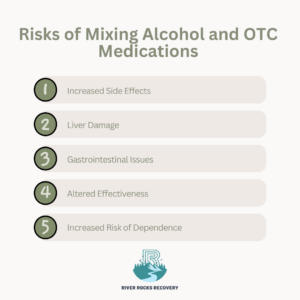When it comes to managing health, many people rely on over-the-counter (OTC) medications for relief from common ailments like headaches, colds, or allergies. However, combining these medications with alcohol can pose significant health risks.
Combining alcohol with over-the-counter (OTC) drugs is more dangerous than many people realize. OTC medications are easily accessible and used to treat common ailments like headaches, colds, and allergies. However, when these medications are taken alongside alcohol, they can lead to serious side effects. In this blog post, we’ll explore the risks of mixing alcohol with OTC drugs, what you should know before combining them, and how to stay safe.
Understanding Over-the-Counter Medications
Over-the-counter drugs are medications that can be purchased without a prescription. They are generally considered safe when used as directed. Common OTC medications include:
- Pain relievers (e.g., acetaminophen, ibuprofen)
- Cold and flu medications (e.g., decongestants, antihistamines)
- Allergy medications (e.g., loratadine, diphenhydramine)
- Sleep aids (e.g., diphenhydramine, melatonin)
While these medications can be effective for temporary relief, they can also interact with alcohol, leading to potentially harmful effects.
Common Over-the-Counter Drugs and Alcohol Interactions
Some OTC drugs are more dangerous than others when combined with alcohol. Here are a few common medications you should be cautious about:
- Pain Relievers (Acetaminophen, Ibuprofen, and Aspirin)
Mixing alcohol with pain relievers like acetaminophen (Tylenol), ibuprofen (Advil), or aspirin can increase the risk of liver damage or stomach bleeding. These medications, especially acetaminophen, can be harmful to the liver, and alcohol only amplifies this risk. - Cold and Allergy Medications (Antihistamines)
Cold and allergy medications often contain antihistamines, which can cause drowsiness. When mixed with alcohol, this effect is heightened, increasing the risk of dizziness, fainting, and impaired coordination. - Cough Syrups
Many cough syrups contain alcohol themselves, and adding more alcohol to the mix can increase sedation. This can lead to dangerously slow breathing and impaired judgment. - Sleep Aids
Over-the-counter sleep aids often contain diphenhydramine, which causes drowsiness. Mixing these medications with alcohol can severely affect your ability to stay awake and alert, potentially leading to dangerous situations like falls or accidents.
Why People Ignore the Risks
Despite the dangers, many people still mix alcohol with OTC drugs without fully understanding the consequences. Some individuals may not be aware of the risks, while others may underestimate the impact of combining the two substances.
For those struggling with substance abuse or alcohol dependency, the situation becomes even more complicated. Addiction can drive individuals to make poor decisions about their health, including mixing alcohol and medications. For anyone experiencing alcohol dependency, seeking help from an Addiction Treatment Center Ohio can provide the necessary support to manage substance use safely.
Risks of Mixing Alcohol and OTC Medications
1. Increased Side Effects
Alcohol can amplify the side effects of many OTC medications. For instance, combining alcohol with antihistamines can lead to increased drowsiness, dizziness, and impaired coordination. This can be particularly dangerous if you need to drive or operate machinery.
2. Liver Damage
Mixing alcohol with acetaminophen, a common pain reliever, can lead to severe liver damage. Both substances are metabolized in the liver, and combining them can overwhelm this organ, increasing the risk of toxicity.
3. Gastrointestinal Issues
Alcohol can irritate the stomach lining, leading to nausea and vomiting. When taken with certain medications, this irritation can worsen, increasing the risk of gastrointestinal bleeding or ulcers, especially with nonsteroidal anti-inflammatory drugs (NSAIDs) like ibuprofen.
4. Altered Effectiveness
Alcohol can interfere with the effectiveness of certain medications. For example, it can diminish the efficacy of cold medications, making it harder for your body to recover.
5. Increased Risk of Dependence
For individuals in recovery, mixing alcohol with any medication can trigger cravings or lead to relapse. It’s crucial to remain vigilant about what you consume during your recovery journey.
Tips for Safe Medication Use
Ensuring the safe use of over-the-counter (OTC) medications, particularly in conjunction with alcohol, is crucial for your health and well-being. Here are some detailed tips to help you navigate this important aspect of self-care:
1. Read Labels Carefully
Why It Matters:
The labels on OTC medications are your first line of defense in understanding how to use them safely. They contain critical information regarding dosages, possible side effects, and warnings about alcohol consumption.
What to Look For:
- Alcohol Warnings: Many OTC medications will explicitly state whether it’s safe to consume alcohol while taking them. Look for phrases like “do not drink alcohol” or “may cause drowsiness; avoid alcohol.”
- Active Ingredients: Understanding the active ingredients can help you assess potential interactions. For example, products containing acetaminophen can be harmful when mixed with alcohol.
- Dosage Information: Pay attention to recommended dosages and frequency. Some medications can be harmful even at slightly elevated doses, especially when alcohol is involved.
If a label is unclear, take a picture or note down the information, and consult with a healthcare professional for clarification.
2. Consult Your Doctor
Why It Matters:
Your healthcare provider or pharmacist can provide personalized advice that considers your health history, current medications, and lifestyle.
When to Consult:
- Before Starting New Medications: If you’re considering a new OTC medication, especially if you’re already taking prescription drugs, consult your healthcare provider to check for potential interactions.
- If You Experience Side Effects: If you notice any adverse effects after taking an OTC medication, discuss these with your healthcare provider. They can help determine if alcohol contributed to these effects.
- Ongoing Treatment for Conditions: If you’re receiving treatment for chronic conditions or addiction, your doctor can help tailor your medication regimen to minimize risks.
Don’t hesitate to bring a list of all your medications, including OTC drugs and supplements, when you visit your healthcare provider. This can help them offer the best advice.
3. Stay Informed
Why It Matters:
Knowledge is power when it comes to managing your health. Understanding the medications you take can help you make informed decisions about your health and wellness.
How to Educate Yourself:
- Research Medications: Use reputable sources to learn about the medications you’re taking. Many websites provide detailed information about side effects and interactions.
- Ask Questions: When picking up a prescription or OTC medication, ask your pharmacist questions about how it interacts with alcohol and other medications.
- Utilize Medication Guides: Many pharmacies provide medication guides with detailed information about potential side effects and interactions. Review these guides carefully.
Consider keeping a medication journal to track what you’re taking, any side effects experienced, and interactions observed. This can be useful for discussions with your healthcare provider.
4. Avoid Alcohol During Treatment
Why It Matters:
If you are in recovery or undergoing treatment for addiction, avoiding alcohol is crucial for maintaining your sobriety and overall health.
Best Practices:
- Commit to Sobriety: Make a firm commitment to avoid alcohol during your recovery. This includes being aware of hidden alcohol in some medications or products.
- Discuss with Your Treatment Team: If you’re in a recovery program, discuss any concerns about medications and alcohol with your treatment team. They can offer strategies to help you navigate these challenges.
- Consider Alcohol-Free Alternatives: If you’re in social situations where alcohol is present, consider non-alcoholic beverages or alternatives that provide similar social experiences without compromising your recovery.
Engage in activities that don’t involve alcohol to support your commitment to sobriety, such as joining support groups, participating in hobbies, or exercising.
The Role of Addiction Treatment Programs
If you or someone you know is struggling with alcohol misuse, it’s important to seek professional help. Alcohol Treatment Programs offer a wide range of services to help individuals overcome addiction and develop healthier habits. These programs often include:
- Partial Hospitalization Program: A structured treatment option that offers intensive therapy while allowing individuals to return home at night. This program is ideal for those who need more support than standard outpatient care but do not require full-time residential treatment.
- Intensive Outpatient Program: This program provides comprehensive care while allowing individuals to continue their daily activities. It involves multiple therapy sessions each week and is suitable for those transitioning out of inpatient treatment.
- Outpatient Treatment Programs: These programs are flexible and designed for individuals with less severe addiction issues. They allow individuals to attend therapy sessions while maintaining their work and family responsibilities.
By seeking help through an Addiction Therapy Program, you can receive the tools and guidance needed to recover from alcohol addiction and avoid dangerous behaviors like mixing alcohol with OTC drugs.
Conclusion
Mixing alcohol with over-the-counter drugs is a risk that many people overlook. The potential dangers are serious and can lead to life-threatening situations. By understanding how alcohol interacts with common medications and taking steps to avoid mixing the two, you can protect your health.
For those struggling with alcohol addiction, seeking help through Addiction Treatment Programs, including Partial Hospitalization Programs or Outpatient Treatment Programs, can be life-changing. Take control of your health and avoid the dangers of mixing alcohol with medications. Embrace the comprehensive care offered at River Rocks Recovery, and contact us today at (888) 905-6281.
FAQ on Mixing Alcohol and Over-the-Counter Drugs
Is it safe to drink alcohol while taking over-the-counter medications?
It depends on the specific medication. Some OTC drugs can have dangerous interactions with alcohol, leading to increased side effects or health risks. Always read the medication label and consult your healthcare provider for advice.
What should I do if I accidentally mix alcohol with an OTC medication?
If you experience adverse effects after mixing alcohol with an OTC medication, seek medical attention immediately. Contact your healthcare provider or visit the nearest emergency room for evaluation.
How can I find out if a specific OTC medication interacts with alcohol?
Check the medication label for warnings about alcohol use. You can also consult with your pharmacist or healthcare provider for specific information regarding potential interactions.
What are the potential side effects of mixing alcohol with OTC medications?
Mixing alcohol with OTC medications can lead to increased drowsiness, dizziness, nausea, liver damage, and diminished medication effectiveness. The severity of these side effects can vary based on the specific medications involved.
Should I avoid alcohol altogether if I’m taking medications?
If you are undergoing treatment for addiction or have concerns about alcohol’s effects on your health, it’s advisable to avoid alcohol entirely. Consult with River Rocks Recovery for personalized recommendations based on your situation.





























